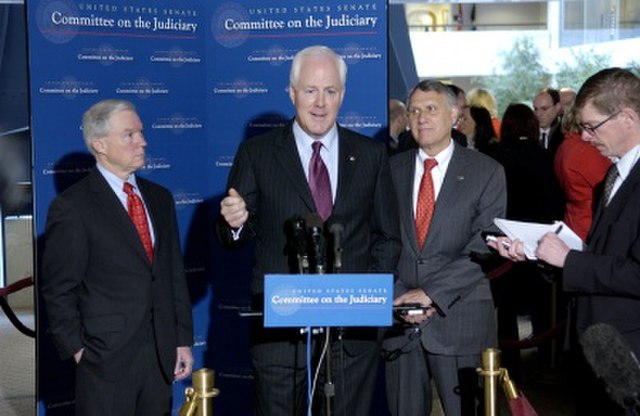Justice Samuel Alito asked Solicitor General Elizabeth Prelogar why the statute the government argues mandates emergency room doctors to perform abortions in a state that bans them uses the phrase “unborn child.”
The Supreme Court heard oral arguments Wednesday in Moyle v. United States, the Biden administration’s challenge to Idaho’s Defense of Life Act, which prohibits abortion except when necessary to save the life of the mother and in cases of rape or incest. The Department of Justice (DOJ) sued the state not long after the Supreme Court overturned Roe v. Wade in 2022, arguing Idaho’s law prevents emergency room doctors from providing abortions in certain circumstances required under the federal Emergency Medical Treatment and Labor Act’s (EMTALA) definition of emergency “stabilizing care.”
During oral arguments, Alito noted EMTALA’s text defines “emergency medical condition[s]” as those that put “the health of the woman or her unborn child in serious jeopardy.” He said it seems to mean that the hospital must “try to eliminate any immediate threat to the child,” though “performing an abortion is antithetical to that duty.”
“Have you seen abortion statutes that use the phrase unborn child?” he asked Prelogar. “Doesn’t that tell us something?”
“It tells us that Congress wanted to expand the protections for pregnant women so they could get the same duties to screen and stabilize when they have a condition that is threatening the health and wellbeing of the unborn child,” Prelogar said. “But what it doesn’t suggest is that Congress simultaneously displaced the independent, preexisting obligation to treat a woman who herself is facing grave life and health consequences.”
SCOTUS Justice Alito & U.S. Solicitor General Elizabeth Prelogar spar over the Emergency Medical Treatment and Active Labor Act’s inclusion of the phrase “unborn child”:
Alito: “Have you seen abortion statutes that use the phrase ‘unborn child’ Doesn’t that tell us something?” pic.twitter.com/PScvKiFG01
— The Recount (@therecount) April 24, 2024
Justice Neil Gorsuch asked a similar question to Joshua Turner, the attorney defending Idaho’s law: “What do we do with EMTALA’s definition of individual to include both the women, and as the statute says, the unborn child?”
“It would be a strange thing for Congress to have regard for the unborn child and yet also be mandating termination of unborn children,” Turner said.
The Supreme Court is hearing a case today on whether ER physicians in Idaho can provide abortions in emergency situations despite the state’s near-total ban, which has narrow exceptions
The question before the justices: Does federal law (EMTALA) preempt the state’s ban? pic.twitter.com/UdgmzOkpoH
— Oriana González (@OrianaBeLike) April 24, 2024
The court’s liberal justices dominated the early portion of oral arguments, throwing skeptical questions at Turner.
“EMTALA is on its face a statute that says it’s not all the state’s way,” Justice Elena Kagan said. “There are federal requirements here.”
Kagan said that abortion is the “standard of care” for certain medical conditions.
“You don’t have to wait until the woman is on the verge of death,” she said. “If a woman is going to lose her reproductive organs, that’s enough to trigger this duty on the part of the hospital to stabilize the patient.”
Justice Sonia Sotomayor asked Turning to answer a series of hypotheticals where a woman’s life is seriously at risk, but the doctor cannot say whether she will die.
“Imagine a patient who goes to the ER with PPROM 14 weeks,” she said. “She was in and out of the hospital up to 27 weeks. This particular patient, they had to deliver her baby, the baby died, she had a hysterectomy. She can no longer have children … You’re telling me the doctor there couldn’t have done the abortion earlier?”
Turner said Idaho’s statute is protective of “doctor judgement” and handles situations on a “case by case” basis.
At one point, Justice Amy Coney Barrett also appeared skeptical of Turner’s answers.
“Counsel, I’m kind of shocked actually because I thought your own expert had said below that these kinds of cases were covered,” she said.
However, Barrett also pressed Prelogar with a question about the Hyde Amendment, which stops taxpayer dollars from funding abortions.
“So I gather from the briefing that there might be some situations in which EMTALA would require an abortion, but the Hyde Amendment wouldn’t permit federal funds to be used to pay for it,” Barrett said. “And you said in your brief that EMTALA requires in other circumstances as well stabilizing treatment to be given that federal funds don’t cover. Can you give an example of that?”
“It is common under EMTALA that hospitals are going to have to provide care where there’s not federal funding available,” Prelogar said. “And I’ll give you an example of a Medicare patient who goes in and his emergency medical condition means he needs a particular drug that’s not covered by Medicare benefits. Still, the hospital has to provide him with stabilizing treatment and give him that medication, even though the federal funding isn’t going to pay for it.”
Barrett, as well as Chief Justice John Roberts, also questioned how EMTALA interacts with individual doctors’ conscience objections.
“Can individual doctors in the emergency room — do they have a conscience exemption?” Roberts asked.
“If an individual doctor has a conscience objection to providing pregnancy termination, EMTALA itself imposes obligations at the entity level, and the hospital should have plans in place to honor the individual doctor’s conscience objection while ensuring appropriate staffing for emergency care,” Prelogar said.

